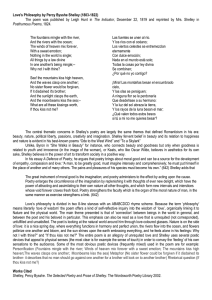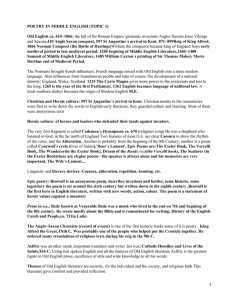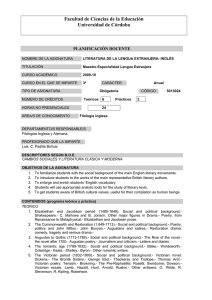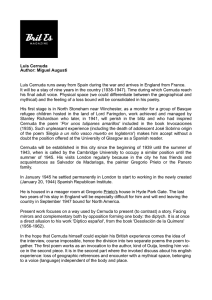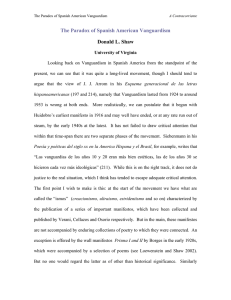Syntactically Silent Subjects: Luis Muñoz and the Poetry of Ellipsis
Anuncio
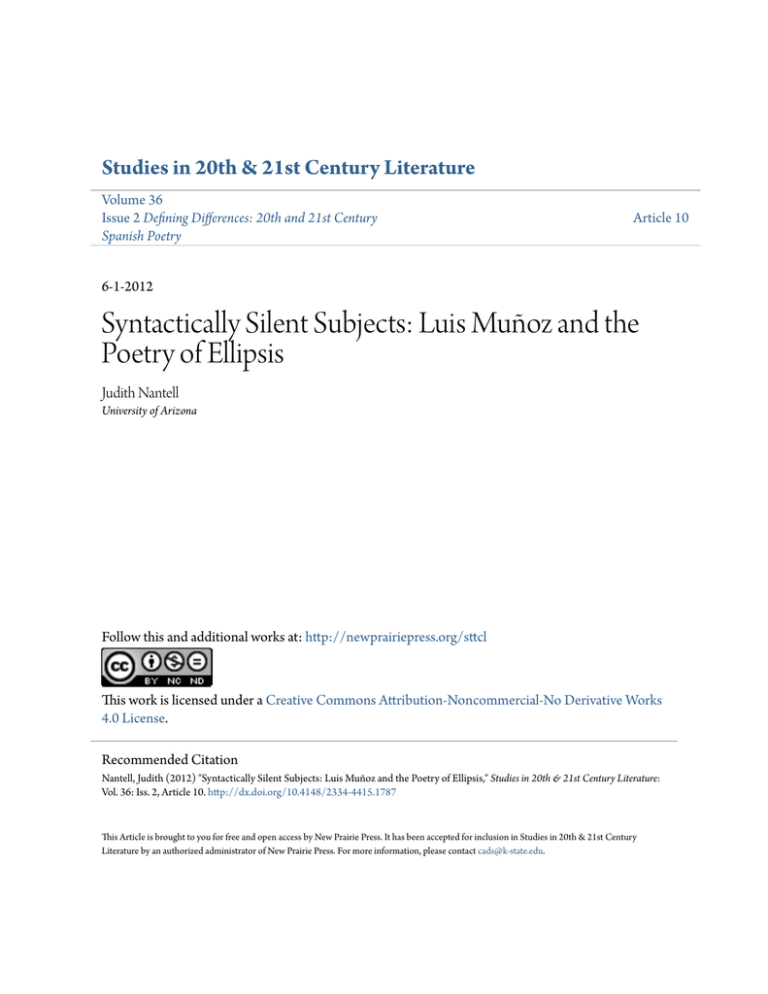
Studies in 20th & 21st Century Literature Volume 36 Issue 2 Defining Differences: 20th and 21st Century Spanish Poetry Article 10 6-1-2012 Syntactically Silent Subjects: Luis Muñoz and the Poetry of Ellipsis Judith Nantell University of Arizona Follow this and additional works at: http://newprairiepress.org/sttcl This work is licensed under a Creative Commons Attribution-Noncommercial-No Derivative Works 4.0 License. Recommended Citation Nantell, Judith (2012) "Syntactically Silent Subjects: Luis Muñoz and the Poetry of Ellipsis," Studies in 20th & 21st Century Literature: Vol. 36: Iss. 2, Article 10. http://dx.doi.org/10.4148/2334-4415.1787 This Article is brought to you for free and open access by New Prairie Press. It has been accepted for inclusion in Studies in 20th & 21st Century Literature by an authorized administrator of New Prairie Press. For more information, please contact [email protected]. Syntactically Silent Subjects: Luis Muñoz and the Poetry of Ellipsis Abstract Luis Muñoz (1966) is one of contemporary Spain’s most salient poets. His work has been described as demonstrating a discourse of ellipsis; yet no study has examined in detail his masterful use of syntactic and figurative omission. In fact, even though Muñoz’s published collections to date span two centuries, no single study has been devoted to his decidedly innovative expressivity. His work has been commented on in various panoramic essays considering contemporary poetry published in Spain at this temporal intersection and a number of his poems have been gathered into noteworthy anthologies of this same era. His poetry has been nominated for prestigious awards in Spain and in 2001 Correspondencias ‘Correspondences’ received the fourth Premio Internacional de Poesía del 27 as well as the Premio de Ojo Crítico de Poesía. The present study examines Muñoz’s most recent Querido silencio (2006) ‘Dear Silence’ where ellipsis figures prominently as the poet maximizes and exploits conceptual and linguistic efficiency. In one exemplary poem, “Dejar la poesía” ‘Leave Poetry,’ two syntactically silent subjects engage in an innovative conversation concerning the nature of poetry. At the same time this intriguing dialogue also offers a unique response to the essential question framing this poem and the collection as a whole: Why is poetry an addiction? This article is available in Studies in 20th & 21st Century Literature: http://newprairiepress.org/sttcl/vol36/iss2/10 Nantell: Syntactically Silent Subjects: Luis Muñoz and the Poetry of Ellip Syntactically Silent Subjects: Luis Muñoz and Poetry of Ellipsis Judith Nantell University of Arizona “Los que leen la poesía la necesitan como drogadictos.” ‘Those who read poetry need it like drug addicts.’ —Francisco Brines1 At the intersection of two centuries, Luis Muñoz (1966) is one of contemporary Spain’s most salient poets. A number of critics have commented on Muñoz’s poetry, characterizing it as “minimalist” (Mainer 36) and “measured” (Morales Barba 44). They note his style to be “pure” (Díaz de Castro), “refined,” “atomized” (Morales Barba 44) and “condensed” (Sánchez-Mesa Martínez 48). In his “poetry of ellipsis and metonymy” (Morales Barba 41) this poet seeks to explore “intellectual enigmas” (Mainer 36). His poems have been anthologized in a number of major turn-of-the-century collections, most notably those presented by Luis Antonio de Villena (1997; 2003; 2010), Rafael Morales Barba (2006) and Domingo Sánchez-Mesa (2007). Most recently, at the turn of the decade, Villena observes that it is in Correspondencias (2001) ‘Correspondences’ and Querido silencio (2006) ‘Dear Silence’ where Muñoz “has found his voice” (La inteligencia 11). Significantly, Correspondencias received two prestigious awards in Spain in 2001: the fourth Premio Internacional de Poesía del 27 ‘Generation of 1927 International Poetry Prize’ and the Premio de Ojo Crítico de Poesía ‘The Critic’s Choice Award in Poetry.’ Nevertheless, no study has examined his poetry in any detail and the present work will address this matter. Muñoz’s most recent poetry demonstrates conceptual and linguistic efficiency due, in part, to his mastery of syntactic omission. Ellipsis figures prominently in this 2006 collection. In one exemplary poem, “Dejar la poesía” (93) ‘Leave Poetry,’ two syntactically silent characters engage in a conceptually efficient conversation concerning the Published by New Prairie Press 1 Studies in 20th & 21st Century Literature, Vol. 36, Iss. 2 [2012], Art. 10 Nantell 325 nature of poetry.2 This work manifests the economy of expression reflected throughout the poetic discourse of Querido silencio. It also, as will be shown, serves as a response to the essential question framing this collection and this illustrative poem: Why is poetry an addiction? In 2005 Muñoz published Limpiar pescado: Poesía reunida ‘Cleaning Fish: Collected Poetry.’ This work contains the majority of his decidedly innovative poems published up to this temporal crossroad. Gathered here are poems from Septiembre (1991) ‘September,’ Manzanas amarillas (1995) ‘Yellow Apples,’ El apetito (1998) ‘Appetite’ and the aforementioned award-winning Correspondencias.3 Limpiar pescado establishes the singular relevance of his work and at the same time brings to light the introductory prologue “Transición” ‘Transition,’ where Muñoz reflects on his identity as a poet and his evolving views concerning his poetics. His essay reveals the conception, development and nature of his poetry at the mid-point of the inaugural decade of the current century.4 One year later, Querido silencio appeared. Here Muñoz continues to practice many of the guiding principles outlined the year before in his aptly named “Transition.” The collection, however, is especially noteworthy because it elucidates what Sánchez-Mesa considers to be a distinguishing feature of the newest poetry emerging in Spain today: “una renovada consciencia poética del lenguaje” (40) ‘a renewed poetic awareness of language.’ With a well-defined economy of words, Muñoz presents in this collection an elegant analysis of innovative and vitally expressive poetic discourse. Sánchez-Mesa’s Cambio de siglo: Antología de poesía española 1990-2007 ‘Turn of the Century: Anthology of Spanish Poetry 19902007’ foregrounds Querido silencio by presenting seventeen poems from it while including seven from Muñoz’s earlier works. This is significant because also in this anthology Muñoz himself elucidates the prominent features of the new expressivity characterizing his most recent work. In particular, when responding to one of the questions posed in the questionnaire presented to each of the poets represented in this anthology, Muñoz makes clear: La lengua es, naturalmente, un instrumento de comunicación, de conocimiento y es un código moral, en el sentido literal, de mor, mores, costumbre, que nos invita a intervenir en él, a jugar, http://newprairiepress.org/sttcl/vol36/iss2/10 DOI: 10.4148/2334-4415.1787 2 Nantell: Syntactically Silent Subjects: Luis Muñoz and the Poetry of Ellip 326 ST&TCL, Volume 36, No. 2 (Summer 2012) a dialogar, a forcejear con él. La identidad de un poeta, que es inevitablemente lingüística, creo que está en el punto que confluyen los elementos personales, sus vivencias, sus ideas y su capacidad sensorial con la corriente de la tradición elegida por él, la que le ayuda a conocer y a conocerse. (Cambio de siglo 405 ‘Turn of the Century’) Language is, naturally, an instrument of communication, knowledge and also a moral code, in the literal sense of mor, mores, customary habits, inviting us to intervene, play, dialogue and struggle with it. The identity of a poet, which unavoidably is linguistic, I believe resides in the confluence of personal elements, his experiences, ideas and sensorial capacity as they merge with his elected tradition, the one that helps him to know and to know himself. 5 Additionally, in another key anthology of this same era, Muñoz furnishes further commentary regarding his evolving poetics. In Rafael Morales Barba’s Última poesía española (1990-2005) ‘Latest Spanish Poetry (1990-2005),’ Muñoz’s “Poética” ‘Poetics’ reveals that for him poetry involves a “search,” an “adventure” and a “conversation” (129-30).6 These recent illuminating descriptions readily characterize Querido silencio. The 2006 collection demonstrates Muñoz’s profound investigation into linguistic identity, both of the poet and, above all, of the poem. “Dejar la poesía” (93) serves as a fine example. This poem probes the nature of poetry. Intriguingly, although it appears to be a self-reflexive poetics, the poem does not establish how to practice the art of poetic composition, nor does it furnish a succinct explanation concerning the process of writing poetry. Instead, by presenting poetry as an addiction Muñoz discloses its intrinsic identity. This poem also illustrates the economy of expression distinguishing Muñoz’s newest poetry. However, as will be shown, “Dejar la poesía” does even more than this. It also concisely demonstrates why his poetry is unmistakably “inventive” (Morales Barba 41) while also providing evidence supporting Mainer’s 2009 claim that Luis Muñoz is one of the most important young poets advancing the new lyric poetry written in Spain today (36). Published by New Prairie Press 3 Studies in 20th & 21st Century Literature, Vol. 36, Iss. 2 [2012], Art. 10 Nantell 327 Por restar mientras que tú sumas. Por llenarte de pájaros la mesa. Por llevarte a donde no sabes salir. Por castigarte sin hablar. Por decirte: estás solo. Por preferir que cargues con su dolor de siglos cuando te sientes nuevo. Por su imán descabellado. Por la sed que produce cuando finge ser agua. Por su vida paralela. Por hablarte cuando quieres dormir. Por su orgullo de bestia descarriada. Porque mira a la muerte con el rabo del ojo cuando canta oh belleza. Por no dar explicaciones. Por suficiente. Por insuficiente. Por beberse la sombra de mañana. (Querido silencio 93)7 By subtracting while you add. By filling your table with birds. By taking you where you know no escape. By punishing you without speaking. By telling you: you are alone. By preferring that you accept the burden of its centuries of pain when you experience something new. By its unbridled magnetism. By creating thirst when pretending to be water. By its parallel life. By speaking to you when you want to sleep. http://newprairiepress.org/sttcl/vol36/iss2/10 DOI: 10.4148/2334-4415.1787 4 Nantell: Syntactically Silent Subjects: Luis Muñoz and the Poetry of Ellip 328 ST&TCL, Volume 36, No. 2 (Summer 2012) By its silly pride. Because it stares death in the face when it sings oh beauty. By not providing explanations. By just enough. By totally insufficient. By drinking up the shadow of tomorrow.8 In this poem Muñoz introduces “poetry” as a distinctive personality with a unique temperament and an extraordinary life of its own (line 12). As such, it knows exactly what it is and what it does (lines 1, 7, 9, 13, 15, 20-22). Possessing unparalleled selfknowledge, “poetry” exhibits a boundless potential, supremacy and self-will (4, 5, 6, 10-11, 16-18, 19). The poem thus features a self-assured leading “character,” first identified in the title. This personage displays an impressive linguistic identity, an inviting conversational style, diverse behavioral patterns and motives, and an uncanny capacity to understand not only its primary functions but also its own enchanting qualities. The poem allows the traits of its central persona to unfold by establishing from the outset its unique association with another fellow “character,” an “impersonal you” (“tú” 1). The latter experiences poetry’s effects (1-9) and, at times, appears to be troubled by these (3, 4, 5, 6-8, 14). Yet the “impersonal you” cannot resist the alluring central personality (9) and its appealing self-expression (10-11, 13-14, 16-18). This dramatic staging is smart and original, but what is most exciting and inviting about this poem is the engaging exchange occurring between “poetry” and “you,” two syntactically silent characters masterfully presented by means of ellipsis. Here the poet utilizes and exploits expressivity by means of syntactic and rhetorical omission. The refined and condensed nature of Muñoz’s “Dejar la poesía” is due in large part to the clarity of expression achieved by means of ellipsis. Its use readily illustrates the minimalist efficacy of this poet’s style as well as the conceptual concision of his poetry. Two complimentary summaries concerning ellipsis ground and inform the present study. One concerns its application in Spanish syntax and the other its use in poetry. In “Empty categories and ellipsis” Josep María Brucart explains: “A rather striking and crossPublished by New Prairie Press 5 Studies in 20th & 21st Century Literature, Vol. 36, Iss. 2 [2012], Art. 10 Nantell 329 linguistically prominent property of natural language is the presence of phonetically unrealized elements in a sentence, necessary for its correct interpretation. This general phenomenon falls under the heading of ellipsis (579).” The New Princeton Encyclopedia of Poetry and Poetics makes clear: In ellipsis the thought is complete; it is only that a word or words ordinarily called for in the full construction but not strictly necessary are omitted (since obvious). This obviousness which makes the omission possible is therefore much facilitated by the use of parallelism of syntactic members in the construction, which explains the importance of such parallelism for achieving that effect of compression. (326) In “Dejar la poesía” the poem’s central “character,” “poetry,” is introduced in the title. Curiously, this immediate, direct, introductory and phonetically realized naming does not occur elsewhere in the poem. Rather, as the poem develops, the presence of “poetry” makes itself known by means of its unmistakable absence. Ellipsis directly figures into this poem at the outset: “Por restar mientras que tú sumas” (1) ‘By subtracting while you add.’ The identity of the “empty subject” of the stated infinitive “restar” in line one is derived from the closest preceding noun, in this case “la poesía,” found in the title. It is “the presence” of such a “phonetically unrealized” element in line one that offers the first indication of the prevalent role syntactic omission will play in this poem.9 “Poetry” will occupy the syntactically “empty subject” position for nine different infinitives in the poem: “restar” (1), “llenar” (2), “llevar” (3), “castigar” (4), “decir” (5), “preferir” (6), “hablar” (13), “dar” (19) and “beberse” (22). In each case the vacant subject of the infinitive is the pronominal PRO, that is “poesía.”10 Additionally, in each case the preposition por, expressing cause, introduces the parallel adverbial phrases in the lines in which these infinitives occur. It is within this pattern that the poet then constructs the poem, as evident in the opening and closing lines that serve as the syntactic framework in which the conversation will take place in “Dejar la poesía” (1 and 22). From the outset Muñoz presents “poetry” by foregrounding its absence (1). The first five introductory lines function as the dramatic http://newprairiepress.org/sttcl/vol36/iss2/10 DOI: 10.4148/2334-4415.1787 6 Nantell: Syntactically Silent Subjects: Luis Muñoz and the Poetry of Ellip 330 ST&TCL, Volume 36, No. 2 (Summer 2012) exposition revealing the fundamental role “poetry” will play in the overall staging of the dialogue taking place among the poem’s distinctive dramatis personae. This introduction also highlights the key role ellipsis is to play in the presentation of “Dejar la poesía.” The opening lines repeatedly call attention to establishing the primacy of the poem’s central character by featuring the syntax of ellipsis. The obvious omission of “poetry” in this opening scene masterfully underscores its captivating syntactic and figurative presence (15). This initial scene also foregrounds the immediacy of Muñoz’s discourse. Here the poet quickly closes any distance between text and reader by establishing the underlying processes of omission and recovery essential to this poem. In Spanish, ellipsis is recoverable from the syntax and elision is recoverable from the content (Brucart, La elisión sintáctica española 7 ‘Syntactic Elision in Spanish’). The poem’s opening lines immediately require the syntactic recovery of “poetry” in order to be understood. The presence/absence of “poetry” as the “empty subject” of additional parallel syntactic constructions introduced by por followed by the infinitive is reinforced as the poem advances and other scenes unfold (6, 13, 19, 22). Syntactic omission thus establishes the important cognitive course of action the reader of this poem must assume in processing empty contents. It is in this way that “Dejar la poesía” further exemplifies another fundamental aspect of Spain’s recent poetry. In Sánchez-Mesa’s view the contemporary poet’s own heightened awareness of language calls for a “competent reader” that readily assumes a prominent role in “comprehending and participating in poetic communication” (39). Expressively, “poetry” also elliptically presents itself in other syntactical positions in the poem. For example, it is the referent of the third person singular possessive su (“su dolor” 7 ‘its pain’, “su imán” 9 ‘its magnetism,’ “su vida” 12 ‘its life,’ and “su orgullo” 15, ‘its pride’). It functions as the “empty subject” of four different third person singular finite verbs (produce 10 ‘creating,’ finge 11 ‘pretending,’ mira 16 ‘stares,’ and canta 18, ‘sings’). It further manifests itself as the empty subject of two different elided infinitives: tener (“Por su imán descabellado” 9 ‘By its unbridled magnetism,’ “Por su vida paralela” 12 ‘By its parallel life,’ “Por su orgullo de bestia descarriada” 15 ‘By its silly pride’) and ser (“Por suficiente” 20 ‘By just enough,’ “Por insuficiente” 21 ‘By totally insufficient’). As the Published by New Prairie Press 7 Studies in 20th & 21st Century Literature, Vol. 36, Iss. 2 [2012], Art. 10 Nantell 331 poem draws to a close “poetry,” as the silent subject of the infinitive “beber,” is also the referent of the telic pronoun se (“Por beberse la sombra de mañana” 22 ‘By drinking up the shadow of tomorrow’). The process of omission, however, begins in the poem’s title. Here another significant yet silent personage is introduced as the elided quasi-impersonal subject of the infinitive dejar. Because this infinitive appears in absolute and initial position, it does not depend on a principal verb or verb phrase preceding it. Both blank space on the printed page as well as Spanish syntax signal as much. However, what is most intriguing is that because there is no plausible governing subject for this infinitive it can be understood in Spanish to have an arbitrary pronominal subject PROarb, corresponding in general to “whoever”—whoever is to leave poetry.11 This evident and immediate use of an elided empty infinitival subject is significant. As a silent character in this poem its presence also is signaled by its absence. Thus, from the very beginning Muñoz launches the play and interplay of the process of creative omission crucial to this poem. Furthermore, the obvious ambiguity of this silent subject allows the poem’s most prominent personality, poetry, to gain importance and perform the lead role. “Dejar la poesía” also features another important syntactically silent “character,” an ambiguous pro-tú, easily interpreted as the “impersonal you,” that converses with “poetry” and in so doing witnesses various modes of being exhibited by the latter.12 The syntactic presence of pro-tú is obvious in the poem’s first line where it performs a specific action: tú sumas (1, ‘you add’). As the poem develops, this “character” soon will experience the effects of “poetry.” We shall learn that it repeatedly is at once drawn to this attractive personality (2, 8, 9, 10-11, 16-18, 22) but, at the same time, also considers abandoning it because of this addictive appeal (3, 5, 13-14). Syntactically, during the course of the poem’s developing conversation, the “impersonal you” functions as the elided subject, in Brucart’s sense, of various finite verbs (sabes 3 ‘know,’ estás 5 ‘are,’ cargues 6 ‘accept the burden,’ te sientes 8 ‘experience,’ quieres 14 ‘want’), demonstrates possessive value (“Por llenarte de pájaros la mesa” 2 ‘By filling your table with birds’), functions as the indirect object (decirte 5 ‘telling you,’ hablarte 13 ‘speaking to you’), is manifested as the direct object (castigarte 4 ‘punishing you’), and, http://newprairiepress.org/sttcl/vol36/iss2/10 DOI: 10.4148/2334-4415.1787 8 Nantell: Syntactically Silent Subjects: Luis Muñoz and the Poetry of Ellip 332 ST&TCL, Volume 36, No. 2 (Summer 2012) in only one instance, is featured as the empty subject PRO-tú of an infinitive (sin hablar 4 ‘without speaking’). The poem begins by establishing a contrast between its two main characters. Here “poetry” performs one action “while” “you” perform another in opposition: “Por restar mientras que tú sumas” (1) ‘By subtracting while you add.’ Later, in the closing lines, “poetry” is characterized as being at one and the same time “sufficient” (20) and yet “insufficient” (21) where both descriptions further enhance the opening dichotomy. As the poem unfolds “poetry” exhibits a number of singular and self-contained powers (6-8, 10-11, 16-18, 22) and does not hesitate to exercise its authority and control (4, 13-14). At times the “impersonal you” benefits as the metaphoric “llenarte de pájaros la mesa” ‘by filling your table with birds’ (2) reveals. However, at other times “poetry” exerts its unswerving supremacy because it, unlike “you,” is fearless in boldly facing existential human enigmas, be they doubt (3), loneliness (5), anguish (6-8), death (16-18) or temporality (22). The primacy of “poetry” is especially evident in one particular instance in the poem: “Porque mira a la muerte / con el rabo del ojo / cuando canta oh belleza” (16-18) ‘Because it stares death / in the face / when it sings oh beauty.’ Here the adverbial conjunction porque introduces a causal subordinate clause. The poet breaks the predominant parallelism of the syntactic construction of por + infinitive and its rhetorically cadenced effects evident in fourteen of the poem’s twenty-two lines. In this important scene, showcasing the poem’s leading “character” in one of its most captivating modes of being, “poetry” is self-assured especially when openly manifesting various facets of its complex linguistic identity. By resourcefully making use of the potential of its own imaginative self-expression, “poetry” does not hesitate to face perplexing existential matters with metaphoric intensity. Here Muñoz not only demonstrates condensed linguistic expression characteristic of his newest poetry but also, and above all, distills from this conversation the essential nature of his subject. The eloquence of the poem’s leading personage is contrasted with the silence of the impersonal you in one telling point in the poem’s conversation where “poetry” proves verbal dominance: “Por castigarte sin hablar” (4) ‘By punishing you without speaking.’ This Published by New Prairie Press 9 Studies in 20th & 21st Century Literature, Vol. 36, Iss. 2 [2012], Art. 10 Nantell 333 marks the only moment in the poem when the PRO-tú occupies the empty subject position of an infinitive, in this case hablar. The syntax of ellipsis emphasizes the resulting silence experienced by the “impersonal you” when reprimanded by “poetry.”13 “Poetry,” in this instance, as well as in three other significant moments in the poem’s conversation, continues to maintain the advantage by effectively articulating its intention (“Por decirte: estás solo” [5] ‘By telling you: you are alone’), addictive nature (“Por hablarte / cuando quieres dormir” [13-14] ‘By speaking to you / when you want to sleep’) and unwavering belief in its discourse (“Por no dar explicaciones” [19] ‘By not providing explanations’). Verbally confident, “poetry” communicates its charm (9), enjoys leading its own life (12) and proudly displays its accomplishments (15). These inherent qualities make possible its unique and creative self-expression. Possessing remarkable linguistic acuity, “poetry” does not hesitate to establish and exhibit its figurative identity. Consciously cognizant of the potential of its verbal expressivity, “poetry” relies and reflects on past manifestations of “su dolor de siglos” ‘its centuries of pain’ and, at the same time, both experiences and relishes its own imaginative discourse when fully consuming the present moment: “Por beberse la sombra de mañana” (22) ‘By drinking up the shadow of tomorrow.’ By expressing its enticing metaphoric possibilities, “poetry” readily displays its magnetism (9). Understood in this way, “poetry,” itself personified, delivers a superb performance: “Por la sed que produce / cuando finge ser agua” (10-11) ‘By creating thirst / when pretending to be water.’ Conversant with its own unbound linguistic potential and attentive to its universal appeal, “poetry” will tantalize “anyone”—you, me, readers, the poet, whomever. The evident omission in these lines (10-11) of the indirect object of the Spanish verb produce, together with the figurative unsatisfied longing experienced and known by “anyone” captivated by poetry’s own enchanting and imaginative idiom, underscore that the poem’s “impersonal you” is not alone. “Dejar la poesía” convincingly makes clear that due to the charming personality of its lead personage, “poetry” always is capable of captivating “anyone” irresistibly drawn to it even when it does not provide explanations: “Por no dar explicaciones” (19). Once again, the empty indirect object for the verb dar in line nineteen not only http://newprairiepress.org/sttcl/vol36/iss2/10 DOI: 10.4148/2334-4415.1787 10 Nantell: Syntactically Silent Subjects: Luis Muñoz and the Poetry of Ellip 334 ST&TCL, Volume 36, No. 2 (Summer 2012) echoes but also serves to reinforce the presence of the indefinite “anyone” encountered earlier (10) and here, for a second time, portrayed in absentia. Self-assured (1, 4), self-reflective (9, 12, 15) and self-contained (19), the nature of “poetry” is such that it derives complete satisfaction when manifesting its metaphoric mastery and aesthetic appeal: “Por beberse la sombra de mañana” (22) ‘By drinking up the shadow of tomorrow.’ In “Dejar la poesía” Muñoz investigates poetic discourse by presenting an enlightening performance featuring two distinct dramatis personae engaged in a lively conversation. The poem reveals the addictive nature of one character, “poetry,” along with a series of persistent circumstances enveloping the other character, the “impersonal you,” caught in a struggle to abandon an irresistible habit.14 Conscious self-expression assumes a significant role when the poet spotlights the self-referential linguistic identity of both personalities. What is most innovative in this poem is the way in which Muñoz enriches the on-going discussion concerning the language of poetry by attentively allowing condensed poetic expression to demonstrate its provocative and unbound potential.15 “Special awareness of language” (Sánchez-Mesa 41) is fundamental to this poem and the collection it uniquely represents. It also is critical to understanding the incisive linguistic identity of this poet and his extraordinary ability to exploit syntactic and poetic ellipses.16 In this way “Dejar la poesía” also serves as an illustrative example of another one of the most distinguishing features characterizing the newest poetry emerging in Spain today—“a syntax that searches for new possibilities” (Sánchez-Mesa 39). At the crucial intersection of the first and second decades of the new twenty-first century, Luis Muñoz and his work will continue to shape and distinguish contemporary Spanish poetry. Notes 1 “Entrevista: Francisco Brines XIX Premio Reina Sofía de Poesía: ‘Los que leen poesía la necesitan como drogadictos’” ‘Interview: Francisco Brines XIX Annual Reina Sofía Poetry Prize: Those who read poetry need it like drug addicts.’ Elsa Fernández-Santos. Madrid, April 29, 2010. El País.com. Unless otherwise indicated, all translations are my own. Published by New Prairie Press 11 Studies in 20th & 21st Century Literature, Vol. 36, Iss. 2 [2012], Art. 10 Nantell 335 2 Page numbers for the poetry provided in the text refer to the 2006 Tusquets publication of Querido silencio. 3 Luis Muñoz’s 2005 Limpiar pescado: Poesía reunida contains a few unedited poems, some recent and others pertaining to his personal notebooks, as well as a few works published in magazines. In his “Note to the Edition,” he indicates that he “corrected the imperfections” in some of the poems from Manzanas amarillas and also elected not to include others previously published as part of this collection (19). 4 “Transition” also is featured on the poet’s website but not translated to English. 5 Muñoz responded to the following: “Trata de enhebrar, en unas pocas líneas, qué significan para ti tradición, lengua e identidad” (405) ‘Try to thread together, in a few lines, what tradition, language and identity mean to you.’ Muñoz indicates in “Transition” that as a poet he is indebted to Juan Ramón Jiménez, Luis Cernuda, Rafael Alberti, Charles Baudelaire and Giuseppe Ungaretti (9-16). In response to a question posed in Luis Antonio de Villena’s 10 menos 30, Muñoz explains his interest in “French symbolist poets” such as Tristan Corbière, Stéphane Mallarmé and Paul Verlaine, as well as the modern “hermetic” Italian poets Ungaretti, Eugenio Montale and Salvatore Quasimodo (119). 6 Although published in 2005, this anthology includes two unedited poems that later would appear in Querido silencio (139-40). 7 As of the writing of this article, this poem also introduces Muñoz’s website. There, however, at the present time, the poem includes a line six, “Porque le rindes cuentas” ‘Because you are accountable to it,’ that does not appear in the definitive version of the poem published by Tusquests in Querido silencio (2006). This was confirmed by the poet in his email to me of January 14, 2011 and in additional conversations I had with the poet in Madrid in May, 2011 when he and I discussed this line. “Dejar la poesía” also is included in Sánchez-Mesa’s Cambio del siglo (420) and Villena’s 2010 La inteligencia y el hacha (173). 8 Muñoz’s website also presents an English translation of this poem. Based on my study, my own translation differs in many respects but coincides for lines sixteen and seventeen. The website translation for lines twenty and twenty-one was useful in that it helps to preserve the contextual elision of the verb “ser” ‘to be’ as discussed in my study. 9 Two works assisted me in my study, Josep María Brucart’s “Empty categories and ellipsis” and his La elision sintáctica en español. I thank my colleague Professor Antxon Olarrea for bringing to my attention Brucart’s fundamental work on ellipsis in Spanish syntax. My analysis of “Dejar la poesía” greatly http://newprairiepress.org/sttcl/vol36/iss2/10 DOI: 10.4148/2334-4415.1787 12 Nantell: Syntactically Silent Subjects: Luis Muñoz and the Poetry of Ellip 336 ST&TCL, Volume 36, No. 2 (Summer 2012) benefitted from my discussions with Professor Olarrea. In particular, I wish to acknowledge his insightful explanations concerning “empty subjects,” the use of PRO and PROarb, empty indirect objects and also the use of the “impersonal you” in Spanish syntax. 10 See Brucart “Empty categories and ellipsis” and, in particular, his discussion of “Empty (pro)nominal categories” (579-90). I do not wish to disrupt the tempo of my article by providing English translations of singular words and brief phrases that I make use of while interpreting the dramatic interplay between the two syntactically silent subjects in Muñoz’s “Dejar la poesía.” I offer a modern linguistic analysis of this poem by emphasizing this poet’s mastery of ellipsis as it is used in Spanish. In modern Spanish theoretical syntax it is imperative that ellipsis not be examined in isolation, but rather in the context in which it is used. With this in mind, I offer a few translations in the endnotes. Here, for example, when citing the nine different infinitives where “poetry” occupies the syntactically “empty subject” the translation yields ‘subtracting,’ ‘filling,’ ‘taking,’ ‘punishing,’ ‘telling,’ ‘preferring,’ ‘speaking,’ ‘providing,’ and ‘drinking up.’ 11 I especially appreciate Professor Olarrea’s guidance on the use of the impersonal PROarbitrario in modern Spanish syntax and his clear-cut example: “Fumar es malo para la salud” ‘Smoking is bad for your health.’ Limpiar pescado: Poesía reunida, Muñoz’s title for his collected works, also exhibits an infinitive in absolute initial position without a clear syntactic referent. Here, too, the vacant pronominal subject could be considered as the quasi-impersonal PROarb corresponding in general to “whoever”—whoever is to clean fish. See “Transition” for Muñoz’s explanation of this curious title (7-8). Additionally, in perusing all of Muñoz’s published collected poetry to date, only “Dejar la poesía” features an initial absolute infinitive with a vacant pronominal subject in the title of a poem. 12 One might be tempted to argue that the “you” is the reader, should the reader wish to identify with what he or she might assume to be her/his textual counterpart, or even the author, should the reader imagine that the poet might be engaged in a conversation with himself. However, the salient and impersonal nature of the second person singular “you” must be considered. Ambiguity and impersonalization already have been posited as distinguishing aspects of the understood Proarb subject of the poem’s lead infinitive of the title. It thus is not surprising that another and different impersonal pronoun pro-tú also has a key role. 13 This line could be misunderstood, thus, I furnish here a concise syntactic summation: “Por (PRO-poesía) castigarte (te=tú) sin (PRO-tú) hablar.” In Spanish “castigar” ‘to punish’ is an object control verb. The infinitival complement “hablar” ‘speaking’ complement to the preposition “sin” ‘without’ Published by New Prairie Press 13 Studies in 20th & 21st Century Literature, Vol. 36, Iss. 2 [2012], Art. 10 Nantell 337 is controlled by the direct object “te=tú” of the main non-finite verb “castigarte.” In this way, Spanish syntax itself brings to light and further reinforces the initial conflict established in the opening line between the poem’s two central characters. Also noteworthy in line four is the effect on the “impersonal you,” to whom the reprimand of the lead character “poetry” is directed. As mentioned earlier, in line four we encounter the singular instance in this poem where the PRO-tú fills the empty subject position of an infinitive, in this case “hablar.” Nonetheless, even when filling the vacant subject position the “impersonal you” continues to experience “poetry’s” dominant self-expression. One further contrast in line four is the transitive use of “castigar” and the intransitive use of “hablar.” 14 As a literary critic I find that I am in an interesting position when approaching “Dejar la poesía.” At the outset, the poem makes clear the lead character’s principal rule of engagement: “Por restar mientras que tú sumas” ‘By subtracting while you add.’ It also makes clear in the title that “whoever” approaches this poem must consider leaving, abandoning “poetry.” The ensuing conversation, as demonstrated in my study, manifests poetry’s addictive nature and magnetic qualities. Thus, if I should choose to identify with the poem’s “impersonal you” I also must accept the role interpretive additions have and the superior function of “poetry” (l. 1). Just the same, poetry is my addiction. 15 It is well known that during the 1980s and 1990s ample discussions and publications brought to the fore a number of different tendencies in Spanish poetry in these decades. See Mainer’s objective review of these debates (3437). Luis Muñoz explains in “Transition” that his approach to poetry does not correspond to the “confrontational” views “circulated” in Spain in the aforementioned decades (11) and Mainer reiterates this point (36). 16 Muñoz’s linguistic awareness and the vitality of his expression point to why his poetry often has been included in significant Spanish anthologies at the turn of the century. I mention here two recent collections informing the present study: Sánchez-Mesa’s 2007 Cambio de siglo and Morales Barba’s 2006 Última poesía. Three other anthologies where Muñoz’s poetry appears also deserve recognition: Luis Antonio de Villena’s 2003 La lógica de Orfeo (Antología), his 1997 10 menos 30 and his 2010 La inteligencia. Finally, see Ángel Luis Prieto de Paula’s overview of the poetry anthologies published during the temporal intersection in Spain discussed here. Works Cited Brogan, T. V. F. “Ellipsis” in Preminger, Alex and T. V. F. Brogan. The New Princeton Encyclopedia of Poetry and Poetics. Princeton: Princeton UP, 1993. Print. http://newprairiepress.org/sttcl/vol36/iss2/10 DOI: 10.4148/2334-4415.1787 14 Nantell: Syntactically Silent Subjects: Luis Muñoz and the Poetry of Ellip 338 ST&TCL, Volume 36, No. 2 (Summer 2012) Brucart, Josep María. La elisión sintáctica en español. Bellaterra: Servei de Publicaciones de la Universitat Autònoma de Barcelona, 1987. Print. Brucart, Josep María and Jonathan MacDonald. “Empty categories and ellipsis.” Hualde, José Ignacio, Antxon Olarrea & Erin O’Rourke. Handbook of Hispanic Linguistics. Cambridge: Blackwell, 2012. 579-601. Print. Díaz de Castro, Francisco. “Querido silencio.” 1 June 2006: n. pag. Web. 29 Oct. 2010. <http://www.elcultural.es/version_papel/LETRAS/17373/Querido_ silencio>. Fernández-Santos, Elsa. “Entrevista Francisco Brines XIX Premio Reina Sofía de Poesía: ‘Los que leen la poesía la necesitan como unos drogadictos.’” 29 April 2010: n. pag. Web. 10 Dec. 2010. http://www.elpais.com/articulo/ cultura/leen/poesia/necesitan/drogadictos/elpepicul/20100>. Mainer, José-Carlos. “Literatura: entre el canon y el mercado.” Literatura y bellas artes. Vol. 5. Ed. Rico, Francisco, Jordi Gracia and Antonio Bonet. España siglo XXI. Madrid: Editorial Biblioteca Nueva, 2009. 15-41. Print. Morales Barba, Rafael. “Introducción.” Última poesía española (1990-2005) Antología. Ed. Rafael Morales Barba. Madrid: Marenostrum, 2006. 7-58. Print. Muñoz, Luis. El apetito. Valencia: Pre-Textos, 1998. Print. —. Correspondencias. Madrid: Visor, 2001. Print. —. “Cuestionario.” Cambio de siglo: Antología de poesía española 1990-2007. Ed. Domingo Sánchez-Mesa Martínez. Madrid: Hiperión, 2007. 404-06. Print. —. Limpiar pescado. Poesía reunida (1991-2005). Madrid: Visor, 2005. Print. —. “Luis Muñoz.” 2009: n. pag. Web. 2 Nov. 2010. www.luismunoz.org. —. Manzanas amarillas. Madrid: Hiperión, 1995. Print. —. “Poética.” Última poesía española (1990-2005). Ed. Rafael Morales Barba. Madrid: Marenostrum, 2006. 129-30. Print. —. Querido silencio. Barcelona: Tusquets, 2006. Print. —. Septiembre. Madrid: Hiperión, 1991. Print. —. “Transición.” Limpiar pescado: Poesía reunida. Madrid: Visor, 2005. 7-17. Print. Prieto de Paula, Ángel Luis. “El medio lírico. Antologías, revistas, poéticas, poetas.” Literatura y bellas artes. Vol. 5. Ed. Rico, Francisco, Jordi Gracia and Antonio Bonet. España siglo XXI. Madrid: Biblioteca Nueva, 2009. 109-33. Print. Published by New Prairie Press 15 Studies in 20th & 21st Century Literature, Vol. 36, Iss. 2 [2012], Art. 10 Nantell 339 Sánchez-Mesa Martínez, Domingo. “Prólogo.” Cambio de siglo: Antología de poesía española 1990-2007. Ed. Domingo Sánchez-Mesa Martínez. Madrid: Hiperión, 2007. 9-65. Print. Villena, Luis Antonio de. 10 menos 30: la ruptura interior en la “poesía de la experiencia.” Valencia: Pre-Textos, 1997. Print. — . La inteligencia y el hacha (Un panorama de la Generación poética de 2000). Madrid: Visor, 2010. Print. — . La lógica de Orfeo: Antología. Madrid: Visor, 2003. Print. http://newprairiepress.org/sttcl/vol36/iss2/10 DOI: 10.4148/2334-4415.1787 16
